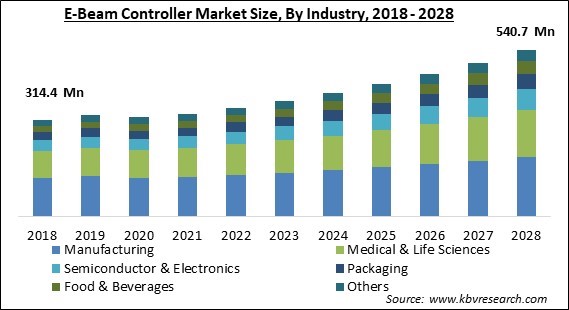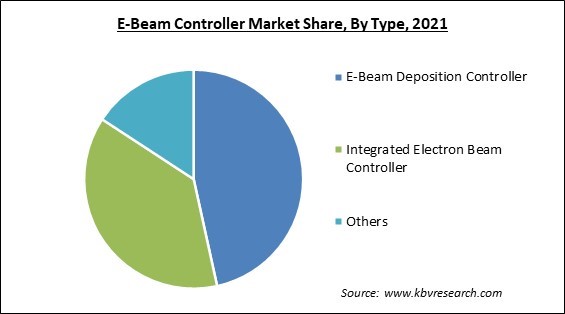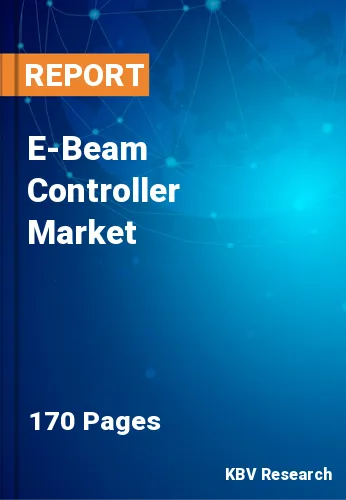The Global E-Beam Controller Market size is expected to reach $540.7 Million by 2028, rising at a market growth of 7.3% CAGR during the forecast period.
An electric field accelerates a stream of electrons to extremely high speeds, creating an electron beam, or e-beam. Beams are produced in an ultra-vacuum chamber by heating a cathode under the influence of an electrical current. They are then accelerated after being exposed to a very high electrical voltage and guided towards a "window" through which they exit the emitter. An electronic beam controller is a tool for managing and controlling the operation of an electron beam system.

An electron cannon, a beam-column, and a sample chamber make up most electron beam systems, and the e-beam controller regulates things like beam energy, beam current, and beam location. The electron beam system is often controlled by an e-beam controller, a computer-based device that employs software. The software gives the user immediate feedback on the system's performance while allowing them to configure and modify several parameters.
Diagnostic tools for tracking down and locating any difficulties or problems may also be included with the e-beam controller. Radiation therapy, sterilization, material processing, and other processes use e-beam controllers. They are a crucial part of electron beam systems because they provide accurate management and control of the electron beam. Modern e-beam controllers may additionally include automation and data logging functions, enhancing operational efficiency and accuracy.
The market for e-beam controllers may see new growth potential as e-beam technology can be coupled with other cutting-edge manufacturing technologies, including 3D printing and laser-based technologies. As a result, several growth opportunities exist in the e-beam controller market. Thus, manufacturers must take advantage of these chances to guarantee the market's continued expansion.
The technology of electron beam processing has many different industrial uses. It offers customers an effective and efficient way to meaningfully alter the performance and characteristics of polymers and other materials. The method is also commonly used to sterilize medications, cosmetics, and medical equipment.
The emergence of the COVID-19 outbreak has significantly negatively influenced the e-beam controller business. Manufacturing & production facilities around the world have been shut down due to crisis and a lack of labor due to governments of many countries imposing and extending lockdowns. With the help of various market experts from different points along the value chain, including OEMs, integrators, end users, suppliers, and distributors, as well as the financial disclosure of different businesses involved in the e-beam controller ecosystem, it has been determined that the market has declined between 2019 and 2020.
Emerging technologies, such as machine-to-machine (M2M), Internet of Things (IoT), vehicle automation, ultra-high-definition (UHD) televisions, and hybrid laptops, are increasing the demand for semiconductor wafers. Thus, as the demand for semiconductor wafers grows, the need for e-beam wafer inspection systems to monitor the wafers' quality and manufacturing process is anticipated to increase. In addition, the increasing demand for semiconductor wafers will substantially impact semiconductor foundries, as they will increase their manufacturing capacities by either expanding existing fabs or constructing new fabs. These factors are further anticipated to positively impact the growth of the e-beam controller market.
Growing adoption of next-generation mobile networks, including 4G and 5G, will raise demand for integrated circuits, driving the expansion of the electronic products market. The development of new infrastructure is necessary for the use of next-generation mobile networks. Chipsets like system-on-chips, radio frequency integrated circuits, cellular integrated circuits, application-specific integrated circuits, and millimeter-wave integrated circuits are used extensively to advance 5G infrastructure, increasing demand for integrated circuits. This will further propel the market expansion in the upcoming years.
The preliminary investment for e-beam welding equipment is a huge financial investment. In light of these expenditures, a business will need substantial inbound work to justify the expense. Because outsourcing is more cost-effective, most businesses, unless they have a high-volume throughput for an extended time, opt to have their EBW requirements met by a third party. As a result, the adoption of e-beam technology is decreasing due to the significant financial investment required, which may impede the expansion of the market.
Based on type, the e-beam controller market is segmented into integrated electron beam controller, e-beam deposition controller and others. The integrated electron beam controller segment garnered a significant revenue share in the e-beam controller market in 2021. The increasing demand for smaller semiconductor devices with greater functionality is a major driver driving the expansion of this market segment. Electrons are routinely & terminally used to sterilize surgical cloths, wound care products, cardiac catheters, and stents. Moreover, the food sector uses this strategy. The segment's growth is anticipated to be bolstered by the widespread use of technology.

On the basis of industry, the e-beam controller market is fragmented into medical & life sciences, semiconductor & electronics, packaging, manufacturing, food & beverages and others. In 2021, the manufacturing segment witnessed the largest revenue share in the e-beam controller market. E-beam additive manufacturing is a comparatively new additive manufacturing (AM) method that can build metallic components with full density directly from electronic data describing the part shape. EBAM has attracted the interest of numerous industries, including the aerospace and medicinal sectors, due to its vast application potential.
| Report Attribute | Details |
|---|---|
| Market size value in 2021 | USD 333.4 Million |
| Market size forecast in 2028 | USD 540.7 Million |
| Base Year | 2021 |
| Historical Period | 2018 to 2020 |
| Forecast Period | 2022 to 2028 |
| Revenue Growth Rate | CAGR of 7.3% from 2022 to 2028 |
| Number of Pages | 170 |
| Number of Table | 290 |
| Report coverage | Market Trends, Revenue Estimation and Forecast, Segmentation Analysis, Regional and Country Breakdown, Companies Strategic Developments, Company Profiling |
| Segments covered | Industry, Type, Region |
| Country scope | US, Canada, Mexico, Germany, UK, France, Russia, Spain, Italy, China, Japan, India, South Korea, Singapore, Malaysia, Brazil, Argentina, UAE, Saudi Arabia, South Africa, Nigeria |
| Growth Drivers |
|
| Restraints |
|
Region wise, the e-beam controller market is analyzed across North America, Europe, Asia Pacific and LAMEA. The APAC region dominated the e-beam controller market with the maximum revenue share in 2021. This is because many semiconductor manufacturing companies are present in the region. For high-quality inspection, semiconductor makers have increasingly adopted these technologies. Wafer inspection systems are in high demand due to the expansion of the semiconductor industry and its manufacturing capacity.
Free Valuable Insights: Global E-Beam Controller Market size to reach USD 540.7 Million by 2028
The market research report covers the analysis of key stake holders of the market. Key companies profiled in the report include Ferrotec Holdings Corporation, INFICON, Serac Group, Telemark, AJA International, Inc., Island e-Beam LLC, ACME (Beijing) Technology Co., Ltd, E-BEAM Services, Inc., Fil-Tech, Inc. and VON ARDENNE GmbH.
By Industry
By Type
By Geography
The global E-Beam Controller Market size is expected to reach $540.7 Million by 2028.
Advent of 4G and 5G in electronic devices are driving the market in coming years, however, High investment required restraints the growth of the market.
Ferrotec Holdings Corporation, INFICON, Serac Group, Telemark, AJA International, Inc., Island e-Beam LLC, ACME (Beijing) Technology Co., Ltd, E-BEAM Services, Inc., Fil-Tech, Inc. and VON ARDENNE GmbH.
The expected CAGR of the E-Beam Controller Market is 7.3% from 2022 to 2028.
The E-Beam Deposition Controller segment acquired maximum revenue share in the Global E-Beam Controller Market by Type in 2021 thereby, achieving a market value of $245 Million by 2028.
The Asia Pacific market dominated the Global E-Beam Controller Market by Region in 2021, and would continue to be a dominant market till 2028; thereby, achieving a market value of $200.3 Million by 2028.
Our team of dedicated experts can provide you with attractive expansion opportunities for your business.

